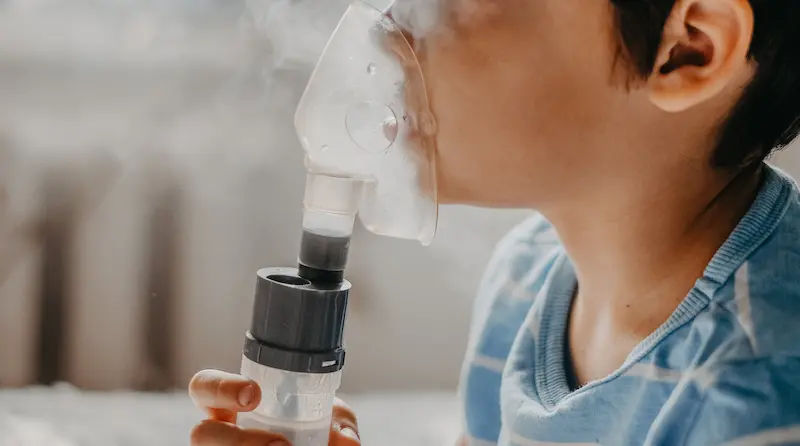Nasal Congestion: Symptoms, Causes, Management And Home Remedies
Learn about nasal congestion, its common symptoms, causes, and effective management. Explore proven home remedies and medical treatments to relieve a blocked or stuffy nose.

Written by Dr. Md Yusuf Shareef
Reviewed by Dr. Dhankecha Mayank Dineshbhai MBBS
Last updated on 13th Jan, 2026

Introduction
A stuffy or blocked nose can turn your day sideways. Nasal congestion isn’t just “extra mucus”—it’s often swelling of the delicate lining inside your nose that narrows airflow and makes breathing harder. Whether your nasal congestion comes from a cold, seasonal allergies, sinus issues, or dry indoor air, the good news is that practical, proven steps can help you feel better—often without a prescription. In this guide, you’ll learn what causes nasal congestion, how to spot red flags, and which home remedies actually work. We’ll break down simple strategies like saline nasal rinses, humidifiers, and sleep positioning, and we’ll cover safe use of over-the-counter options like decongestant sprays, antihistamines, and nasal steroid sprays. You’ll also find tailored advice for babies, pregnancy, and seniors. If symptoms persist beyond two weeks or keep coming back, we’ll explain when to seek medical care and what tests or treatments might help. Let’s unblock the myths, reduce the swelling, and help you breathe easier—starting today.
Understanding Nasal Congestion
Nasal congestion happens when the blood vessels and tissues in the nasal passages swell and produce excess mucus, narrowing the space air can pass through. That’s why you can feel “blocked” even without a runny nose. Your nose is more than a simple air tube: it warms, humidifies, and filters the air, trapping particles and pathogens in mucus. Tiny hair-like cilia then move that mucus toward the throat to be swallowed or cleared. When viruses (like those causing the common cold), allergens, or irritants inflame the nasal lining, swelling and mucus production increase, leading to nasal congestion.
It’s helpful to distinguish congestion from other nasal symptoms. A runny nose (rhinorrhea) is mainly about increased mucus drainage. Post-nasal drip is the sensation of mucus draining down your throat. You can have all three at once, but the treatments that reduce swelling (like saline irrigation or steroid nasal sprays) specifically target congestion. During sleep, gravity and blood flow changes can make nasal congestion worse, particularly when lying flat. That’s why elevating your head at night can help. In most cases from a common cold, congestion improves in 7–10 days; if nasal congestion lingers or worsens, consider other causes like allergies, sinusitis, or structural issues.
Consult Top Specialists
What “nasal congestion” really means
• Swollen nasal tissues and blood vessels narrow airflow.
• Mucus can increase, but swelling is the main blocker.
• Nighttime and lying flat often intensify symptoms.
How the nose filters, warms, and humidifies air
• Nasal turbinates increase surface area, warming and humidifying air.
• Mucus and cilia trap and clear particles.
Why swelling and mucus create a blocked nose
• Inflammation from infection or allergy leads to oedema and secretions.
• Cycle of irritation and swelling keeps nasal congestion going.
What Causes Nasal Congestion?
Several overlapping factors can create nasal congestion. Viral infections (like the common cold) are the top cause and usually resolve within 1–2 weeks. Allergic rhinitis triggers nasal congestion when your immune system reacts to pollen, dust mites, pet dander, or molds. Nonallergic rhinitis is congestion without an allergic trigger—often due to irritants (smoke, strong odours), weather changes, or hormonal shifts. Bacterial sinusitis can develop after a viral cold, especially if congestion persists with facial pressure and purulent discharge.
Structural issues like a deviated septum or nasal polyps physically narrow your nasal passages. In pregnancy, rising estrogen and blood volume can cause “pregnancy rhinitis,” a common source of nasal congestion. Certain medications can also contribute. Notably, overusing topical decongestant sprays for more than 3 days can cause rebound congestion (rhinitis medicamentosa), making the problem worse. Other contributors include GERD (acid irritation), hypothyroidism, and prolonged dry air exposure.
Common causes: colds, flu, allergies, nonallergic rhinitis
• Viral colds: abrupt onset, sore throat, nasal congestion, usually self-limited.
• Allergies: sneezing, itch, watery eyes, seasonal or perennial patterns.
• Nonallergic rhinitis: triggers include smoke, odours, temperature changes.
Sinusitis, nasal polyps, and deviated septum
• Acute sinusitis: nasal congestion with facial pain/pressure, thick discharge.
• Chronic rhinosinusitis: symptoms >12 weeks; may include polyps.
• Deviated septum: one-sided persistent obstruction.
Environmental triggers: smoke, pollution, and weather shifts
• Indoor pollutants, wildfire smoke, cold dry air, or sudden humidity changes can inflame the nasal lining.
Medications and rebound congestion (rhinitis medicamentosa)
• Overuse of topical decongestants (e.g., oxymetazoline) >3 days risks rebound symptoms.
Special Causes: Pregnancy Rhinitis, GERD, Thyroid Issues
• Pregnancy rhinitis is common and usually resolves postpartum.
• GERD and endocrine disorders can contribute to chronic nasal congestion.
Symptoms, Red Flags, and Diagnosis
Typical nasal congestion can come with runny nose, post-nasal drip, reduced smell, and mild facial pressure. For viral colds, most people improve within 7–10 days. Allergies often present with itchy nose, sneezing, and watery eyes. Nonallergic rhinitis tends to be more irritation-driven (e.g., strong perfumes or smoke).
Red flags include: high fever lasting more than 3 days, severe or worsening facial pain, swelling around the eyes, vision changes, confusion, very thick or bloody discharge, or symptoms lasting beyond 10–14 days without improvement. Persistent one-sided nasal congestion can hint at a structural issue (deviated septum or polyp). In children, unilateral foul-smelling discharge may indicate a foreign body.
Diagnosis typically starts with a clinical history (duration, triggers, seasonality) and physical exam. If allergies are suspected, skin prick tests or blood IgE tests can help identify triggers. Nasal endoscopy or sinus CT may be recommended for chronic or recurrent symptoms, suspected polyps, or anatomic problems. If symptoms persist beyond two weeks, consult a doctor online with Apollo 24|7 for further evaluation. For chronic congestion with suspected allergies or inflammation, Apollo 24|7 offers convenient home collection for tests like total IgE or a complete blood count (CBC) to support diagnosis.
Evidence-Based Home Remedies for Nasal Congestion
Home remedies are a strong first line for nasal congestion, especially in colds, mild sinus inflammation, and allergic rhinitis.
• Saline irrigation: Rinsing the nose with isotonic or hypertonic saline reduces swelling, thins mucus, and improves ciliary function. Evidence suggests saline irrigation can reduce symptoms and the need for medications in chronic rhinosinusitis. Use sterile, distilled, or previously boiled and cooled water (never straight tap water) and device-specific instructions (neti pot, squeeze bottle) to prevent infection. Start with isotonic saline once or twice daily. Many people notice improved airflow within minutes.
• Humidification, hydration, and warm compresses: A cool-mist humidifier keeps indoor humidity around 30–50%, helping prevent nasal dryness and thick secretions. Regularly clean the device to avoid mould. Drink fluids throughout the day to keep mucus thin. Warm compresses across the cheeks and bridge of the nose can ease sinus pressure.
• Steam inhalation: While common, evidence for steam’s benefit is limited, and hot steam carries a risk of burns, especially for children. If you use it, avoid direct contact with boiling water and keep sessions brief.
• Sleep strategies: Elevate your head with an extra pillow, try side sleeping, and keep the bedroom air clean. A pre-bed saline rinse and a shower can reduce nighttime nasal congestion at night.
• Unique insight: Consistency beats intensity. Light but regular saline rinses, daily humidification, and gentle routines often outperform sporadic “big” interventions. If your condition does not improve after trying these methods, book a physical visit to a doctor with Apollo 24|7.Consult Top Specialists
Over-the-Counter Medicines: Safe and Smart Use
OTC options can give meaningful, short-term relief when used wisely:
• Topical decongestant sprays (e.g., oxymetazoline, xylometazoline): These shrink swollen blood vessels for fast relief but should be used for no more than 3 consecutive days to avoid rebound congestion (rhinitis medicamentosa). If you already have rebound, your doctor may advise a taper plan and a switch to steroid nasal sprays.
• Oral decongestants (e.g., pseudoephedrine, phenylephrine): May reduce swelling but can raise blood pressure, increase heart rate, and interfere with sleep. People with hypertension, heart disease, glaucoma, or urinary retention should avoid or use only with medical guidance. For many, a short course during daytime hours is best.
• Antihistamines: Non-drowsy second-generation options (cetirizine, loratadine, fexofenadine) are useful when allergies drive symptoms. They reduce sneezing and runny nose more than swelling, but often help overall nasal congestion when allergies are active.
• Nasal steroid sprays (fluticasone, mometasone, budesonide): Highly effective for allergic and nonallergic inflammation; they reduce swelling and mucus. Benefits build over several days; daily use yields the best results. Correct technique matters: aim slightly outward, away from the septum, and sniff gently.
• Unique insight: Pairing a daily steroid nasal spray with once-daily saline irrigation improves delivery and reduces irritation. Always read labels for age limits and interactions. When in doubt, consult a doctor online with Apollo24|7.
Lifestyle and Natural Approaches
Nasal congestion often reflects both triggers and baseline inflammation, so small daily habits matter.
• Allergen avoidance and indoor air quality: Use high-efficiency particulate air (HEPA) filters, encase pillows and mattresses if dust mites are an issue, and wash bedding weekly in hot water. Keep pets out of the bedroom. During high pollen days, close windows and shower before bed. Avoid smoke exposure.
• Diet and hydration: While diet isn’t a cure, an anti-inflammatory pattern (vegetables, fruits, omega-3s, whole grains) can support mucosal health. Limit alcohol (it can dilate nasal blood vessels) and stay well-hydrated to keep mucus thin. Spicy foods may temporarily loosen mucus for some people—use as tolerated.
• Breathing techniques and gentle exercise: Nasal breathing exercises (slow diaphragmatic breaths through the nose), light aerobic activity, and yoga can aid nasal airflow via autonomic balance and improved circulation. For nonallergic vasomotor rhinitis, avoiding sudden temperature changes and strong odours helps reduce nasal congestion.
• Unique insight: Create a “nasal hygiene” routine—morning saline rinse, midday hydration check, evening bedroom prep (humidifier on, air clean, spray if prescribed). Consistency helps prevent daily flare-ups of nasal congestion at night.
Special Situations: Babies, Pregnancy, and Seniors
• Babies: Their nasal passages are small, so mild swelling causes big symptoms. Use saline drops and a bulb syringe or nasal aspirator to gently clear mucus. Run a cool-mist humidifier near the crib. Avoid OTC decongestants for infants unless your paediatrician advises. If the baby has breathing difficulty, poor feeding, fever, or symptoms last beyond a few days, seek medical care.
• Pregnancy: “Pregnancy rhinitis” is common due to hormonal changes. Focus on saline irrigation, humidification, elevating the head at night, and safe physical activity. Some steroid nasal sprays (e.g., budesonide) have favourable safety profiles in pregnancy, but always consult your obstetrician first. Avoid oral decongestants in the first trimester unless advised by your doctor.
• Older adults: Dryness and polypharmacy are common. Saline rinses and humidification are safe mainstays. Be cautious with oral decongestants if you have hypertension, heart disease, glaucoma, or prostate enlargement. Steroid nasal sprays are generally safe when used correctly; technique training can improve results.
• Unique insight: In all three groups, gentle, moisture-focused approaches work best. For personalised guidance, consult a doctor online with Apollo 24|7—especially for baby nasal congestion remedies and pregnancy rhinitis home remedies.
Prevention: Stop Nasal Congestion Before It Starts
• Hand hygiene and cold prevention: Wash hands regularly, avoid touching your face, and stay up to date on recommended vaccines (e.g., flu). If someone in your home has a cold, don’t share towels or utensils, and clean high-touch surfaces. Most colds resolve in 7–10 days, but careful prevention reduces spread.
• Seasonal allergy planning: Start steroid nasal sprays 1–2 weeks before your worst allergy season. Track pollen counts and preemptively use non-drowsy antihistamines on high-count days. Maintain allergen-proofing at home (HEPA filters, bedding encasements).
• Air and environment: Keep humidity 30–50% and ventilate kitchens/bathrooms to prevent mold. Avoid indoor smoke and strong fragrances. During travel or altitude changes, sip water often, use saline spray, and consider a humidifier if you’re staying in very dry climates. These steps reduce the baseline risk of nasal congestion.
When to See a Doctor and What to Expect?
Consider medical care if nasal congestion persists beyond 10–14 days, recurs frequently, is one-sided, or is accompanied by high fever, severe facial pain, swelling around the eyes, or vision changes [1]. Doctors may recommend:
• Allergy testing (skin prick or blood IgE) to find triggers
• Imaging (CT of sinuses) for chronic rhinosinusitis or suspected polyps.
• Endoscopy for persistent or one-sided blockage.
• Occasional lab tests (CBC if infection suspected). Apollo 24|7 offers convenient home collection for tests like total IgE or CBC.
Treatment pathways include targeted medications (steroid sprays, antihistamines), short tapers of topical decongestants if safe, saline irrigation, and in some cases short courses of antibiotics for bacterial sinusitis. For structural issues (e.g., significant deviated septum or polyps), procedures or surgery may be discussed. If symptoms persist beyond two weeks, consult a doctor online with Apollo 24|7 for further evaluation and tailored care.
Consult Top Specialists
Conclusion
Nasal congestion can make breathing, sleeping, and thinking feel harder than they should. Fortunately, you have plenty of effective, safe options to clear the air. Start with evidence-based home strategies: daily saline nasal rinses with sterile water, a cool-mist humidifier, steady hydration, and smart sleep positioning. Add targeted over-the-counter help when needed—antihistamines for allergies and steroid nasal sprays for ongoing inflammation—while respecting the 3-day limit on topical decongestant sprays to avoid rebound congestion. Focus on prevention by improving indoor air quality, planning ahead for allergy seasons, and practicing good hand hygiene during cold and flu months. For babies, pregnancy, and older adults, emphasise gentle, moisture-centred care and medication safety.
Pay attention to red flags and duration. If your nasal congestion lasts beyond two weeks, is severe, or keeps returning, it’s time to look deeper. A consultation can pinpoint triggers like allergies, chronic sinusitis, or structural issues and tailor your treatment plan. If symptoms persist beyond two weeks, consult a doctor online with Apollo24|7 for further evaluation. When testing is appropriate, Apollo24|7 offers convenient home collection for tests like total IgE or CBC to support diagnosis. With a consistent routine and the right guidance, you can reduce swelling, improve airflow, and finally breathe easier.
Consult Top Specialists

Dr Syed Mateen Pasha
General Physician
2 Years • MBBS
Bengaluru
PRESTIGE SHANTHINIKETAN - SOCIETY CLINIC, Bengaluru

Dr. Vivek D
General Physician
4 Years • MBBS
Bengaluru
PRESTIGE SHANTHINIKETAN - SOCIETY CLINIC, Bengaluru

Dr. Syed Ismail Ali
General Practitioner
7 Years • MBBS
Hyderabad
Apollo 24|7 Clinic, Hyderabad

Dr. Harshendra Jaiswal
General Physician/ Internal Medicine Specialist
12 Years • MBBS , MD (General medicine)
Kolkata
108 DHANA DHANVANTARI Clinic, Kolkata
(25+ Patients)
Dr. Thandra Ramoji Babu
General Physician/ Internal Medicine Specialist
5 Years • MBBS, DNB(General Medicine)
Warangal
Sai Ram multi-specialty hospital, Warangal
Consult Top Specialists

Dr Syed Mateen Pasha
General Physician
2 Years • MBBS
Bengaluru
PRESTIGE SHANTHINIKETAN - SOCIETY CLINIC, Bengaluru

Dr. Vivek D
General Physician
4 Years • MBBS
Bengaluru
PRESTIGE SHANTHINIKETAN - SOCIETY CLINIC, Bengaluru

Dr. Syed Ismail Ali
General Practitioner
7 Years • MBBS
Hyderabad
Apollo 24|7 Clinic, Hyderabad

Dr. Harshendra Jaiswal
General Physician/ Internal Medicine Specialist
12 Years • MBBS , MD (General medicine)
Kolkata
108 DHANA DHANVANTARI Clinic, Kolkata
(25+ Patients)
Dr. Thandra Ramoji Babu
General Physician/ Internal Medicine Specialist
5 Years • MBBS, DNB(General Medicine)
Warangal
Sai Ram multi-specialty hospital, Warangal
Consult Top Specialists

Dr Syed Mateen Pasha
General Physician
2 Years • MBBS
Bengaluru
PRESTIGE SHANTHINIKETAN - SOCIETY CLINIC, Bengaluru

Dr. Vivek D
General Physician
4 Years • MBBS
Bengaluru
PRESTIGE SHANTHINIKETAN - SOCIETY CLINIC, Bengaluru

Dr. Syed Ismail Ali
General Practitioner
7 Years • MBBS
Hyderabad
Apollo 24|7 Clinic, Hyderabad

Dr. Harshendra Jaiswal
General Physician/ Internal Medicine Specialist
12 Years • MBBS , MD (General medicine)
Kolkata
108 DHANA DHANVANTARI Clinic, Kolkata
(25+ Patients)
Dr. Thandra Ramoji Babu
General Physician/ Internal Medicine Specialist
5 Years • MBBS, DNB(General Medicine)
Warangal
Sai Ram multi-specialty hospital, Warangal
More articles from Nasal congestion
Frequently Asked Questions
1) What’s the fastest way to relieve nasal congestion at home?
A saline nasal rinse followed by a warm shower and head elevation often gives quick relief. For short-term use, a topical decongestant spray can help—but limit to 3 days to avoid rebound congestion.
2) Is steam inhalation good for a blocked nose?
It may feel soothing, but evidence for lasting benefit is limited, and hot steam can cause burns—especially in children. Try humidification and saline rinses instead.
3) Which is better for allergies: antihistamines or nasal steroid sprays?
They work differently. Antihistamines help sneezing and runny nose; steroid sprays reduce inflammation and swelling, making them especially helpful for nasal congestion from allergies. Many people benefit from both.
4) How do I safely do a saline nasal rinse?
Use sterile, distilled, or previously boiled and cooled water. Follow device instructions, lean forward, and rinse both sides. Clean the device after each use.
5) When should I see a doctor for nasal congestion?
Seek care if symptoms persist beyond 10–14 days, are severe, are one-sided, or if you have high fever, swelling around eyes, vision changes, or severe facial pain. You can consult a doctor online with Apollo 24|7.




